Industrial zone workers: realities in low-quality living quarters
The images of the evacuation of workers and families from industrial zones to return to their hometown, or forced to stay in huts to carry out stay-at-work strategies during the pandemic peak last year, are still etched on the minds of many people.
The situation had never happened before, with only influxes of people from other provinces towards Ho Chi Minh City being common before coronavirus broke out in 2020.
“You can secure your life with accommodation” is a Vietnamese slogan. With stable housing and ensuring adequate living conditions, employees can have the best health, spirit, and psychology to concentrate on production as well as improving the productivity, quality, and quantity of products.
But today new angles emerge on the centuries-old question of how to ensure synchronisation between industrial and urban development, both developing the economy and ensuring a good quality of life for the people. It is a question that needs a robust solution soon.
On June 12, Prime Minister Pham Minh Chinh addressed approximately 4,500 workers in the northern province of Bac Giang, as well as other workers via livestream from across the country.
The forum also created an opportunity for workers to express their expectations and proposals relating to their jobs, the living standards, accommodation, and education of their children.
Room with a view
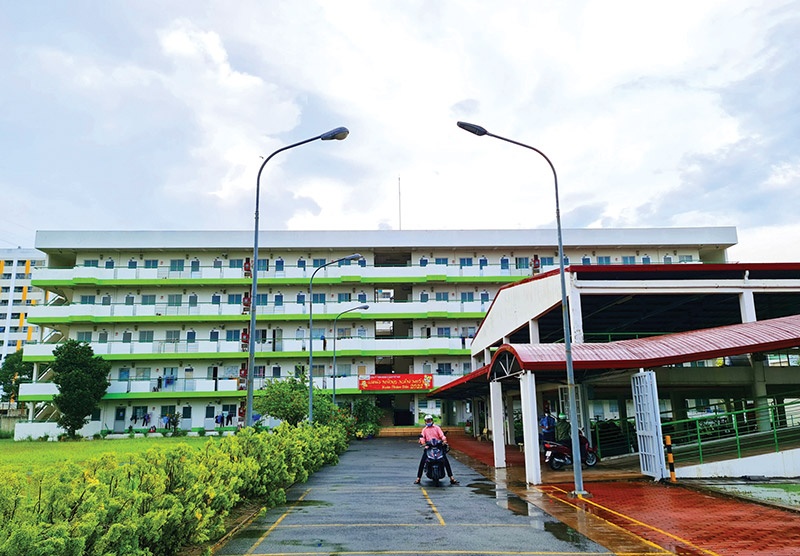 |
| Industrial zone workers: realities in low-quality living quarters, Photo Le Toan |
On an area of over 10,000 square metres of VSIP I in the southern province of Binh Duong, this residence is always strictly protected like a high-class apartment with a security system. Inside the building, the hallways are cleaned daily, and there is also a sports yard, gym, reading room, and a hall for public activities.
Vu Quoc Huy, chairman of Showa Gloves’ Trade Union, said that the accommodation was built in 2008 with 128 rooms. “Each room can accommodate up to three people, which are mainly for single female workers. Here, rooms, electricity, and water bills are free of charge,” Huy said.
Building homes for workers still only on paper
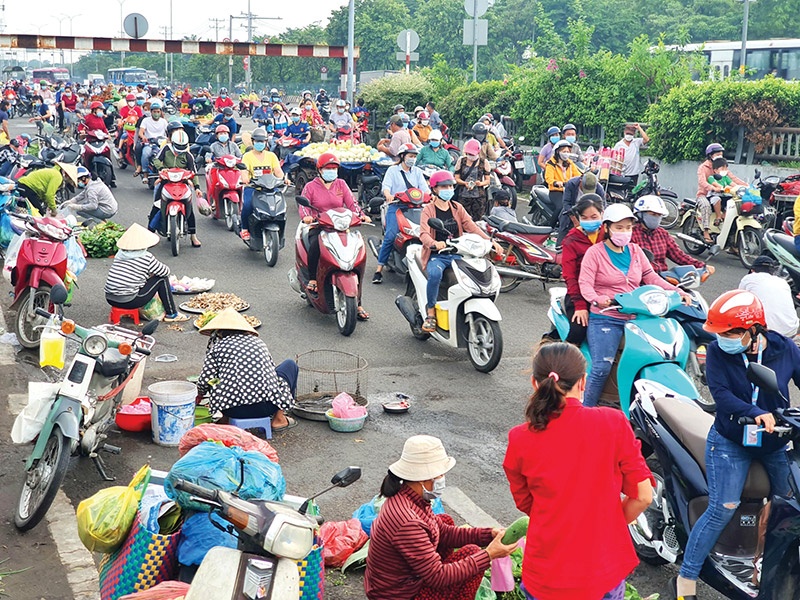 |
| Photo Le Toan |
The surrounding areas of sports shoe manufacturer Pouyuen Vietnam in Binh Tan district of Ho Chi Minh City are famous for motel rooms. Almost every family in this locality has rooms for lease to workers of Pouyuen, an enterprise with more than 56,000 workers – the largest one in Ho Chi Minh City.
Nguyen Van Loi, general director of Thien Phat Tourism Construction Investment JSC, has wanted to build homes for rent for years, but complicated procedures continue to hinder his plans.
Similarity, located opposite Loi’s land, is a 500 house-for-rent venture with a 50-year land lease term – but although it was started in 2008, no-one knows when it can actually be finished.
However, this supply is far from the demand. In April, around 1,000 social units started construction. Ho Chi Minh City aims to build 35,000 social houses from 2021 to 2025 and an additional 58,000 units will be added between 2026 and 2040.
Home sweet home for workers
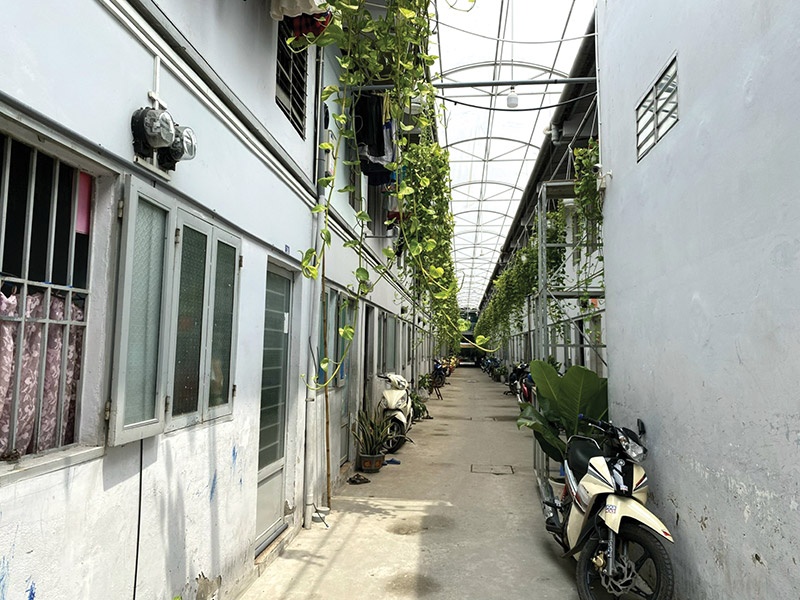 |
| Photo Le Toan |
Nguyen Thanh Tam, 45 years old, is owner of a dormitory in District 12, which is one of the more popular destinations for workers. Established in 2005 with the first 36 rooms, now Tam is developing towards 150 rooms which can take in more than 500 residents, mostly workers in neighbouring factories and industrial zones.
From the beginning, Tam designed quality hostels with a wide path in the middle covered by a roof, protecting the residents from sun and rain. Every room in this project has its own ventilation system. “I want to turn my hostel into a warm community where people care about each other. Although it is an inn, each resident living here considers it his or her own home, preserving the living environment, and uniting and helping each other,” said Tam.
Hoping for normality
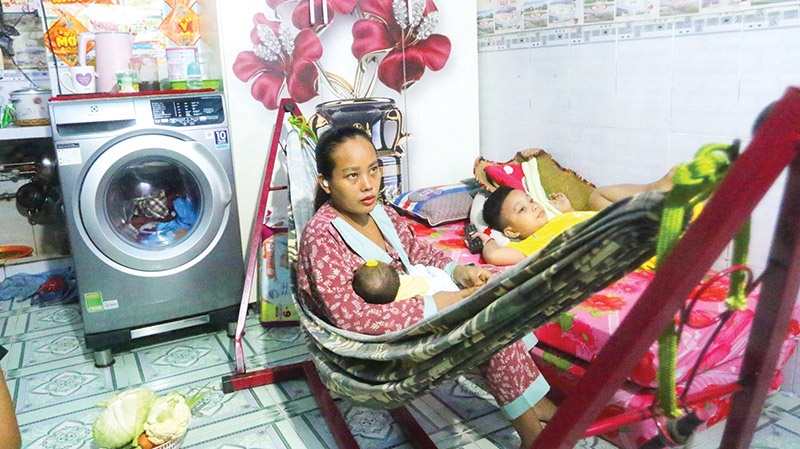 |
| Photo Le Toan |
Even though they have to spend perhaps up to 12 hours a day in the factory, many workers are generally happy and accepting. For them, trying to earn decent wages means at the end of the month they can sleep peacefully.
There are many wishes, but the biggest desire for workers is to have their own home. But this wish is far out of reach for many people. In reality, their biggest dream at the moment is to not be unemployed, not fall ill, and be able to rent a decent apartment.
Chau Phek, 36, and 35-year-old Sray Hoa work in the southern province of Dong Nai and live in a small hostel for $35 per month. The company supports them with $9 per month for house leasing. “The hostel is very small, but it is all we can afford,” said Phek.
Struggle in tiny motel room
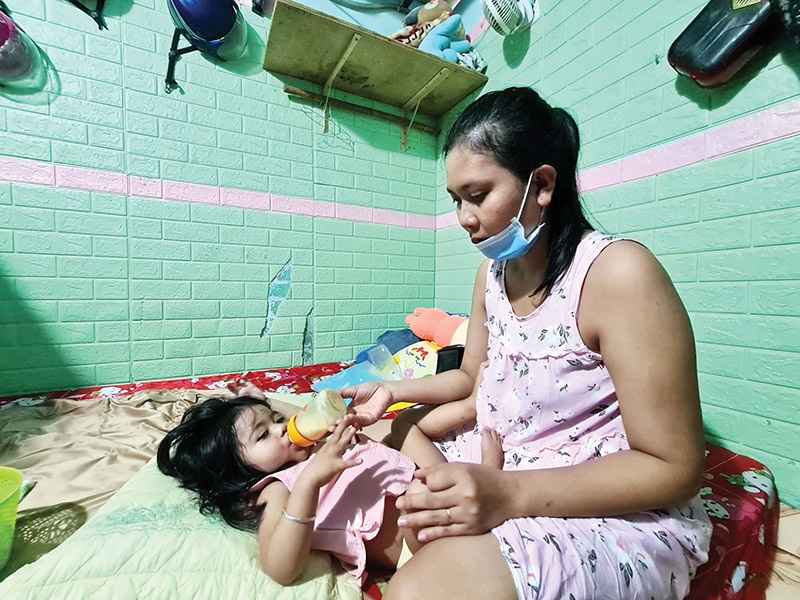 |
| Photo Le Toan |
Thach Thi Hong Sa and her husband left the countryside to work for TBS Group in Binh Duong 15 years ago. Today, they still can only afford to rent a tiny motel room in a degraded inn at a rate of $43 per month.
Despite the relatively stable working situation, the family can save very little money, and even this can easily disappear if their child gets sick, or another unforeseen expense crops up.
The price in the open-air market is much lower than in supermarkets, however, Sa can get 300g of pork and a small bunch of vegetables. “I must save money because I am not paid for another 20 days,” Sa said. “It is very difficult to earn money in the countryside in the rice fields, which is why my husband and I moved to Ho Chi Minh City to work in a factory.”
Living under the stairs
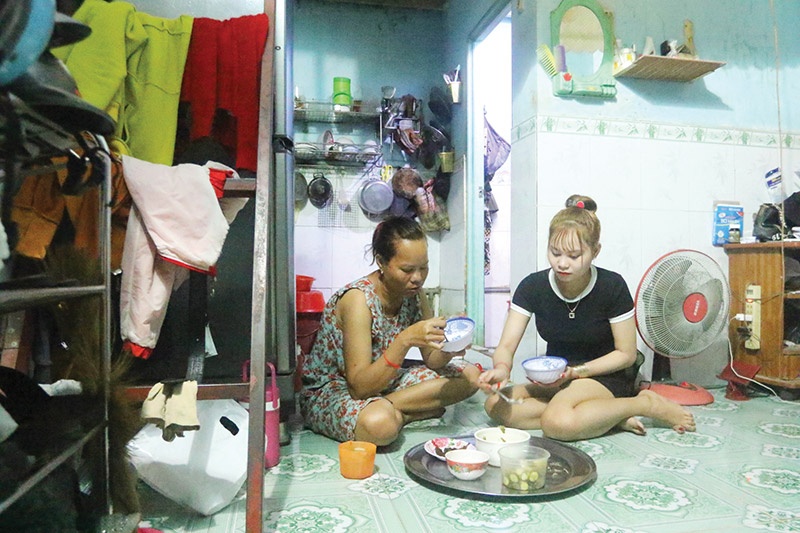 |
| Photo Le Toan |
In Dong Nai, workers like 45-year-old Neang Soc Nuong live in squalid conditions in between shifts at Chang Shin Company in Thach Phu Industrial Zone. Two rows of rooms are located opposite each other, with clothes drying in the dark corridor. Nuong’s room is a daily living space for herself as well as for her husband and adult daughter. All work for the same company.
“It’s just a temporary place for sleeping overnight,” Nuong told VIR. However, they have “lived temporarily” for more than a decade.
Each month a worker can save 20 per cent, equivalent to $65-78, for social housing. It simply means that their dream of having a house to call their own in Ho Chi Minh City is far from reach.
Emphasis on working and saving
 |
| Photo Le Toan |
Dang Thi Phuong Linh, an 18-year-old born in the central province of Ha Tinh, is sharing with two friends from her hometown a room of only 10sq.m located deeply in a lane in Binh Tan district of Ho Chi Minh City. Linh said that the monthly fee for room, electricity, and water is more than VND700,000 ($30.50) per person. Normally, Linh goes to work all day, eats at the company, and works overtime until nearly 9pm, so the room is just to sleep overnight. Linh and other young workers have to save a little more money to send back to her parents’ hometown.
“Normally I go to work all day and work overtime, so I can only use the room at night anyway. Sundays at home are a struggle due to the pressure of a claustrophic space. We have to come out to the street until late evening to get fresh air. It would be very expensive to rent a better room, which would cost at least $44 per person per month, and we cannot afford to pay,” she said.
Nguyen Thi Trang, the owner of an inn which neighbours Phuong’s motel, said that each room can accommodate up to four people at a rent of VND1.2 million ($52) per month. This means a worker only needs to spend VND300,000 ($13) a week to get a place in this cramped room. But for Phuong Linh and many other workers working in the Pouyuen Vietnam factory, they don’t put much emphasis on the quality of the accommodation because they only return to the motel room in darkness, and rush out again in the morning before the street lights have even turned off.
What the stars mean:
★ Poor ★ ★ Promising ★★★ Good ★★★★ Very good ★★★★★ Exceptional
Related Contents
Latest News
More News
- Launch of the “Green Moments - Green Actions - Green Future” photography contest (June 06, 2025 | 12:02)
- Military parade held to celebrate National Reunification Day (April 30, 2025 | 11:00)
- Symbols of Ho Chi Minh City beneath the "Wings of Steel" (April 28, 2025 | 18:40)
- Ho Chi Minh City: A modern urban metropolis after 50 years of reunification (April 21, 2025 | 08:56)
- Tan Son Nhat T3 officially open for commercial flights (April 17, 2025 | 15:03)
- Armed forces rehearse for 50th anniversary of reunification (April 14, 2025 | 12:30)
- Ho Chi Minh City lights up for 50th anniversary of reunification (April 11, 2025 | 17:03)
- Explore a green university campus like a five-star resort in northern Vietnam (April 01, 2025 | 19:00)
- Ho Chi Minh City Metro Line No. 1 officially opens (December 23, 2024 | 14:39)
- Honouring consulting firms with outstanding strategies and M&A deals (November 29, 2024 | 14:32)

 Tag:
Tag:


















 Mobile Version
Mobile Version